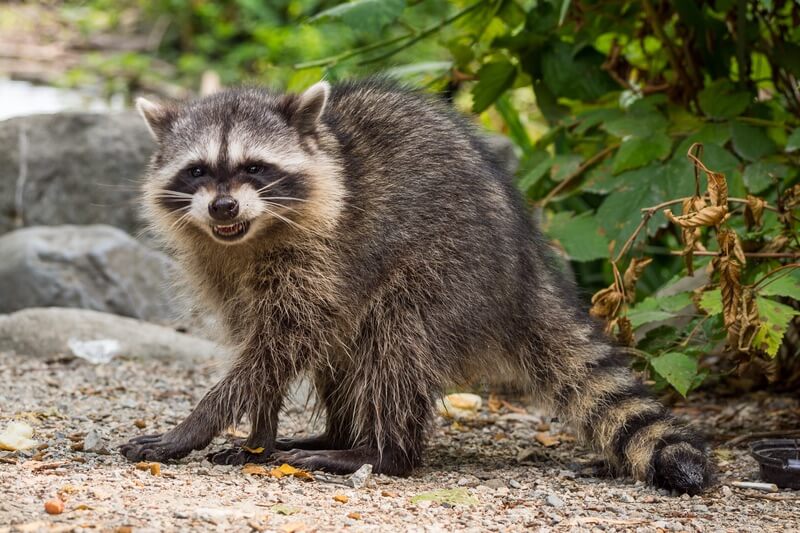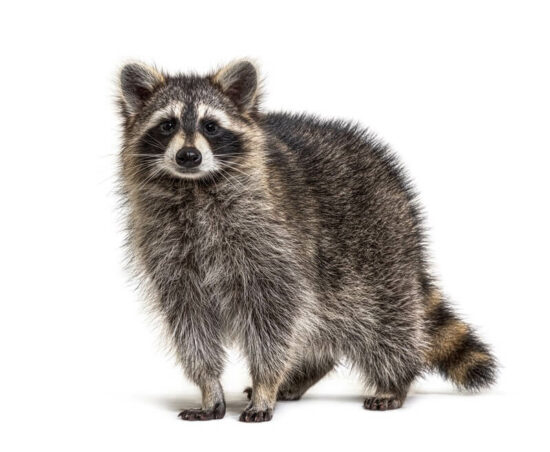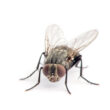Many people who own chickens understand how important it is to keep them away from potential predators. And a large percentage of them want to know if raccoons eat chickens.
Raccoons are intelligent creatures that can cause plenty of headaches for anyone who has chickens. Read this guide to learn if they’ll kill these birds, and how you can keep them away from your birds.
Table of Contents
Do Raccoons Eat Chickens?
Chickens are a joy to raise! Whether you keep them around for a steady supply of eggs or to harvest their meat later, these animals are pretty easy to take care of regardless of your homesteading experience. In fact, many jurisdictions allow you to keep chickens in suburban backyards!
Unlike other livestock, they don’t require tons of time, money, or space to keep. With a small coop in the backyard, you can have fresh eggs for years to come.
But what about those pesky raccoons?
There’s a good chance that a few curious raccoons live around your property or in your neighborhood. Will they be a problem for your chickens?

Unfortunately, raccoons do eat chickens (among other animals). They are one of many potential threats your chickens face. Those egg-laying birds can also be a target of foxes, hawks, coyotes, weasels, and more.
All that said, raccoons tend to be one of the more vicious chicken predators. The nighttime bandits are too intelligent for their own good. Pair that with their nimble fingers and ability to navigate their surroundings in the dark, and they can cause serious trouble for chicken owners.
Raccoons will do anything they can to eat your chickens if they find them. What’s worse is that once they attack, they’ll come back. These animals reportedly remember food sources for up to three years!
So if you suspect that a raccoon is killing your chickens, you need to take action to keep them safe (more on that later).
How To Tell If A Raccoon Has Attacked Your Chickens
If a raccoon has already attacked or eaten your chickens, you’ll probably know!
These animals aren’t subtle. While they do a fantastic job of staying unseen at night, they’re not so graceful in how they treat prey. They don’t care about leaving the sight pristine like other animals to disguise their presence once they go.
Some animal experts say it’s almost like raccoons want you to know they were there!
When a raccoon has killed a chicken there will be bits and pieces of the chicken left behind. You’ll see feathers everywhere, organs, entrails, and tons of other gross stuff. It’s not a pretty sight, and many would say it’s downright diabolical!
Raccoons typically go for breast meat. They might chew on other things depending on how hungry they are. But in most cases, they’ll tear the chicken to bits and get rid of the parts they don’t want.
You may even see chicken guts strewn across your property. Many homeowners report seeing blood and other entrails on other sides of their property or even on their front porch.
In addition to guts, you’ll see footprints. Raccoons have distinct prints that look like tiny human hands. They don’t have thumbs, but there are five pointy fingers with claws on end.
Always keep an eye out for raccoon tracks around your chicken coop. You may see them before these pests are lucky enough to get in and snag a chicken. If you see them around the enclosure, you know that a raccoon is interested and will likely try again.
It’s a good idea to look around for raccoon droppings as well. Raccoons tend to create “bathrooms” that they will use repeatedly. Known as “scat stations” or “latrines,” they appear as large piles of parasite-ridden feces.
Expert Tip: Be careful around those! Raccoons are carriers of roundworms and other parasites. Plus, they can be full of disease!
Scat stations indicate that raccoons are in the vicinity. They might have moved closer to the chickens, trying to get into the coop. Look for scat stations in corners, hidden in bushes, and inside structures. You might even have one inside your attic or garage!
Of course, keep an eye out for raccoon nests as well. These animals can live in nest-like structures high in trees. However, they can also live underground in abandoned dens or natural cavities that form in trees.
Any sign that a raccoon is nearby should raise red flags. If you have chickens, it’s only a matter of time before those pests try to break their way through the coop and eat your birds.
How Raccoons Get To Your Chickens
How do these clever animals get to your chickens, anyway? There are plenty of cunning animals that meander through your property in the dead of night, but raccoons are unique.
They have dexterous hands that help them get through barriers that other animals can’t break apart. Plus, they have sharp claws and strong teeth to aid in their entry.
Here are just a few ways that raccoons get to your chickens.
A Strong Sense Of Smell
Before a raccoon even sees the chickens, they’ll smell them. These critters have a strong sense of smell, and they’ll use it to find your chickens no matter how well you hide them. Tall, solid fences aren’t enough to keep your chickens away from hungry raccoons.
But that’s not all. These bandits will also use their sense of smell to find an entry point. It’s not just the chickens that attract them. The feed you use to keep your birds alive will draw them in, too.
With powerful olfactory glands to support them, raccoons will sniff their way to small openings or compromised parts of your fence. Once they’ve done this, they’ll kill your chickens quickly.
Skilled Climbing
Did you know that raccoons are skilled climbers? Despite the heaviest weighing 20 pounds or more, these animals can scale tall trees and walls without missing a beat! That’s why they often end up in attics or chimneys.
If your chicken coop is next to a tall structure, don’t be surprised if raccoons get in and kill a few birds. It doesn’t matter how tall your fence is. As long as they can climb a nearby wall or tree, they can get over it!
Expert Tip: If that wasn’t enough, raccoons can fall about 40 feet without getting injured. Don’t think that a two-story house will deter these determined pets.
Simple Locks
One of the biggest mistakes people make when keeping chickens is using a simple lock. That’s a lesson most folks have to learn the hard way.
In normal circumstances, a simple sliding lock or hook-based latch is fine. It’s enough to keep most animals out and prevent the chickens from escaping. What more do you need, right?
Unfortunately, raccoons are too clever for simple locking mechanisms. Remember: that they have five fingers and agile hands. They might not inherently know how to use a lock, but they only need a few minutes to figure things out.
Anything simple enough to open with one motion is not secure enough to keep raccoons from eating or killing your chickens.
Poking Through Barrier Materials
Here’s one of the more grisly ways raccoons can get to chickens.
Contrary to popular belief, chicken wire is not a foolproof barrier. It’s fine when there are no pests around, and the only thing you need the material for is to keep chickens contained. But when a raccoon encounters chicken wire, it’s not a fair fight.
Once again, their hands come into play. Raccoons can easily break through chicken wire. It’s more flexible and easier to maneuver than most realize. It doesn’t take much pressure to destroy it.
When that happens, raccoons usually take what they can get. They don’t need to get inside the coop entirely. As long as they can reach a hand in there, it’s game over.
Many raccoons will get through small holes or weak chicken wire to kill chickens bit by bit. They’ll use their claws to maim the chicken and eat them.
How To Stop Raccoons From Killing Your Chickens
When you’re raising chickens, raccoons are public enemy number one! If these animals are nearby, it’s not a matter of “if.” It’s a matter of “when.”
Raccoons will eventually attempt to kill and eat your chickens. So how do you stop them? Here are a few ways to deter raccoons and keep your birds safe.
Secure Feed
Never leave chicken feed out in the open. Many people use a free-feeding technique to give chickens easy access to food whenever they need it. While that certainly makes things easier for you, it’s also a surefire way to attract raccoons.
Raccoons are highly opportunistic, and they’ll take what they can get. Chicken feed is pretty enticing and is another thing that will draw these critters in.
To prevent raccoons from gaining access to the food and your chickens, secure it. Ditch free feeding and do what you can to lock food away every night. Bring it inside, clean up remnants, and lock extra feed up in steel containers with tight-fitting lids.
Collect Every Egg
Those tasty eggs you get to collect every day? They’re another big attractor for raccoons. And if the raccoon has access to the eggs, they’ll try to eat chickens as well.
Take time to collect every last egg in the coop. Do so as quickly as possible and leave no opportunities for raccoons to get them. Once they have a taste, they’ll keep coming back for more.
Expert Tip: Check the chicken area every day. During peak production time in the summer, check it twice. It’s always a good idea to do a once-over around dusk to ensure that there are no eggs around when the sun goes down.
Take Care Of Garbage
Here’s a good tip you should follow whether you have chickens or not: Lock up your trash!
There’s a reason why people refer to these creatures as garbage bandits. They take every opportunity to get food and won’t hesitate to dig through your garbage and eat your trash!
If you have trash lying out in the open, it’ll draw the raccoons in and more attention to your chickens. While they come for the trash, they stick around to try and eat the chickens.
Lock up trash and use tight-fitting lids for your bins. Also, pay attention to other potential food sources. If you have dogs or cats, bring their food inside.
Expert Tip: If you have a pond with fish, consider covering it with netting. Anything that could attract a raccoon should be taken care of.
Pay Attention To Chicks
Your chicks are the most vulnerable. They’re far easier for raccoons to get, and they won’t put up a fight like some adult chickens. As a result, many raccoons will go for those young birds first.
Keep them safe, and don’t let them wander until they’re ready. Make sure every young chick roosts at dusk so that they’re not alone and vulnerable to attacks.
Build A Coop
If you don’t already have one, consider building a coop. A chicken coop is a small shelter full of roosting boxes for hens to lay eggs. More importantly, it’s another layer of protection.
Place the coop in the enclosure, and raccoons will have two barriers preventing them from killing your chickens.
You can go all out or keep things simple. It’s up to you.
Expert Tip: Many modern homesteaders use handy tech items like automatic doors and lighting. The doors open up at dawn and close up at dusk once every chicken is in to roost, creating tons of security.
Use Strong Barriers
We’ve already talked about the pitfalls of chicken wire. The stuff is useful when you don’t have any predators to worry about, but it’s far too easy for raccoons to get through.
Instead of using chicken wire, consider using hardware fabric or smaller chain link fencing. Hardware fabric is the go-to for most. It doesn’t negatively impact light or ventilation. However, it’s much more durable than chicken wire.
When installing it, take the metal wire all the way to the ground!
Raccoons can burrow underneath traditional fences if they’re trying to eat chickens. Consider burying the hardware fabric several feet below ground surface level in an L-shaped configuration. Extend the material out horizontally under the ground.
That way, raccoons will encounter another barrier if they try to dig their way under your fence.
Use More Complex Locks
Ditch the simple sliding locks and hoop latches. Raccoons are too intelligent for those. Many animal experts even think they can figure out more complicated locks if given the time.
Use more substantial locks to ensure that raccoons aren’t making their way through those doors. Anything with a padlock, key, or number combination will do.
Employ Common Deterrents
There’s no shortage of pest control methods to keep raccoons away. Consider using some.
You can use the animal’s strong sense of smell against them by spreading essential oils, cayenne pepper, or even ammonia-soaked rags (here’s a list of scents raccoons hate). However, keep in mind that whatever you use will be near your chickens. You don’t want to use anything that could kill your birds.
Expert Tip: Many chicken-keepers like to utilize motion-activated deterrents. Lights, noise-makers, and sprinklers are all fantastic choices that raccoons will trigger if they attempt to kill your chickens.
Call Pest Control
If you’ve tried everything and raccoons keep eating your chickens, call in some help!
Animal control experts can easily set up traps and relocate the raccoons that give you trouble. Make sure that they take them a decent distance away. Raccoons can always use their smell to come back, so they should be released far enough away that they can’t return.
Conclusion
Since you now know that raccoons will eat chickens, your next step should be to take preventative measures. Look at your current setup and see where you can make improvements. It’s often an easier process that you’d think!
If you have any other questions about situations where raccoons will kill chickens or want us to clarify the information above, send us a message.


